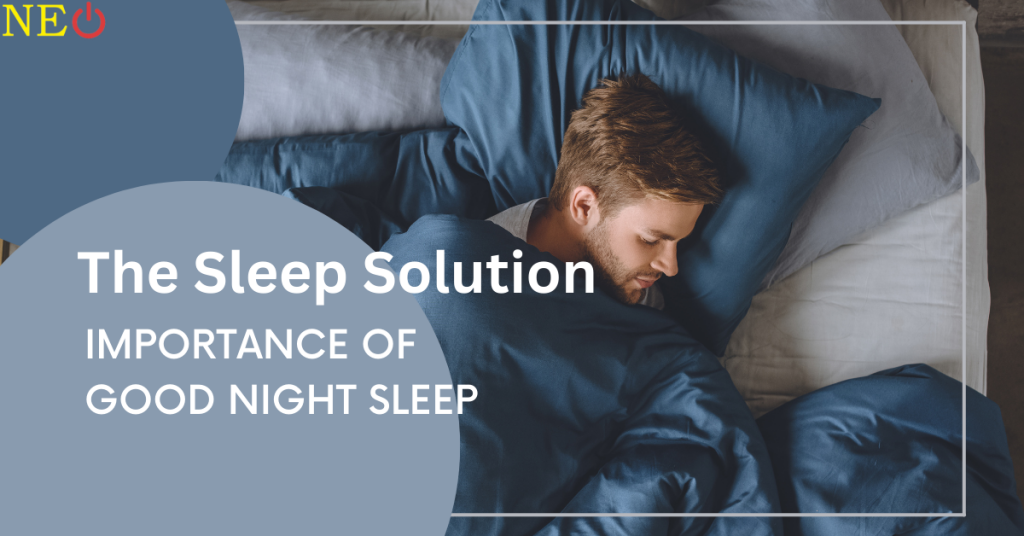Sleep is frequently disregarded or forgone in today's hectic society in favor of work, social interactions, or entertainment. In actuality, though, sleep is essential to our general quality of life, mental and physical health, and both. We'll examine the science of sleep, look at the advantages of getting enough sleep for your health, talk about the negative effects of sleep deprivation, and offer helpful advice for getting a better night's sleep.
Understanding the Science of Sleep
Sleep is a complex biological process that occurs in multiple stages, each with its own distinct characteristics and functions. The sleep cycle consists of two main types of sleep: rapid eye movement (REM) sleep and non-rapid eye movement (NREM) sleep. During REM sleep, our brains are highly active, and this is when dreaming occurs. NREM sleep, on the other hand, is characterized by slower brain waves and is believed to be important for physical restoration and repair.
Several neurotransmitters and hormones play key roles in regulating sleep, including serotonin, melatonin, and adenosine. Serotonin helps regulate mood and promotes feelings of relaxation, while melatonin signals to the body that it's time to sleep. Adenosine, meanwhile, accumulates in the brain throughout the day and promotes sleepiness. Circadian rhythms, which are internal biological clocks that regulate our sleep-wake cycle, also play a crucial role in determining when we feel alert and when we feel sleepy.
Health Benefits of Adequate Sleep
Prioritizing sleep can have a profound impact on our physical health, mental well-being, and overall quality of life. Adequate sleep is essential for cognitive function and memory consolidation, allowing our brains to process information, form memories, and learn new skills effectively. Research has shown that individuals who get enough sleep consistently perform better on tasks requiring attention, problem-solving, and decision-making.
In addition to cognitive benefits, sleep also plays a critical role in regulating mood and emotional well-being. Chronic sleep deprivation has been linked to an increased risk of mood disorders such as depression and anxiety, as well as heightened emotional reactivity and irritability. Getting enough sleep can help stabilize mood, improve emotional regulation, and enhance overall mental health.
Furthermore, sleep is essential for maintaining a healthy immune system and preventing illness. During sleep, the body produces cytokines, proteins that help regulate inflammation and immune response. Sleep deprivation has been shown to weaken the immune system, making individuals more susceptible to infections such as the common cold and flu. By prioritizing sleep, we can bolster our immune defenses and reduce the risk of illness.
Sleep also plays a crucial role in regulating metabolism and weight management. Chronic sleep deprivation disrupts hormonal balance, leading to increased levels of ghrelin, a hormone that stimulates appetite, and decreased levels of leptin, a hormone that signals feelings of fullness. As a result, sleep-deprived individuals may experience increased hunger and cravings for unhealthy foods, which can contribute to weight gain and obesity over time.
Effects of Sleep Deprivation
Conversely, sleep deprivation can have a range of negative effects on our physical and mental health. In the short term, sleep deprivation can impair cognitive function, memory, and reaction time, leading to decreased productivity, increased errors, and impaired decision-making. Chronic sleep deprivation has also been linked to an increased risk of chronic health conditions such as obesity, diabetes, cardiovascular disease, and certain types of cancer.
In addition to physical health consequences, sleep deprivation can also take a toll on our mental well-being. Chronic sleep deprivation has been associated with an increased risk of mood disorders such as depression and anxiety, as well as heightened emotional reactivity and irritability. Sleep-deprived individuals may also experience difficulties regulating emotions, managing stress, and coping with daily challenges.
Furthermore, sleep deprivation can have a significant impact on our immune system, leaving us more vulnerable to infections and illnesses. Research has shown that sleep-deprived individuals are more likely to catch the common cold or flu, and may take longer to recover from illness compared to those who get adequate rest. Chronic sleep deprivation has also been linked to an increased risk of chronic diseases such as obesity, diabetes, and cardiovascular disease.
Tips for Improving Sleep Quality
Fortunately, there are several strategies you can implement to improve the quality of your sleep and reap the many benefits of adequate rest. Here are some tips to help you get a good night's sleep:
- Establish a consistent sleep schedule: Go to bed and wake up at the same time every day, even on weekends. This helps regulate your body's internal clock and promotes better sleep quality.
- Create a relaxing bedtime routine: Develop a calming pre-sleep routine to signal to your body that it's time to wind down. This could include activities such as reading, taking a warm bath, or practicing relaxation techniques such as deep breathing or meditation.
- Optimize your sleep environment: Create a comfortable and conducive sleep environment by ensuring your bedroom is cool, dark, and quiet. Invest in a comfortable mattress and pillows, and consider using blackout curtains or white noise machines to block out any distractions.
- Limit exposure to screens and stimulating activities: Avoid using electronic devices such as smartphones, tablets, and computers before bedtime, as the blue light emitted by these devices can disrupt your body's natural sleep-wake cycle. Instead, opt for relaxing activities such as reading or listening to calming music.
- Monitor your caffeine and alcohol intake: Limit consumption of caffeine and alcohol, especially in the hours leading up to bedtime, as these substances can interfere with your ability to fall asleep and stay asleep.
- Manage stress and anxiety: Practice stress-reduction techniques such as mindfulness meditation, yoga, or progressive muscle relaxation to help calm your mind and promote relaxation before bedtime.
- By incorporating these tips into your daily routine, you can improve the quality of your sleep and enjoy the many health benefits that come with getting adequate rest.By incorporating these tips into your daily routine, you can improve the quality of your sleep and enjoy the many health benefits that come with getting adequate rest.
Addressing Common Sleep Disorders
Despite our best efforts, many individuals may still struggle with sleep-related issues due to underlying sleep disorders. Some of the most common sleep disorders include insomnia, sleep apnea, restless leg syndrome, and narcolepsy. These disorders can have a significant impact on sleep quality and overall well-being, and may require professional evaluation and treatment.
Incorporating Sleep into a Healthy Lifestyle
Prioritizing sleep is essential for maintaining overall health and well-being, yet it's often overlooked in today's busy world. By recognizing the importance of sleep and making it a priority in our lives, we can reap the many benefits of adequate rest and enjoy improved physical, mental, and emotional health. Whether it's establishing a consistent sleep schedule, creating a relaxing bedtime routine, or addressing underlying sleep disorders, there are many steps we can take to improve the quality of our sleep and enhance our overall well-being.
sleep plays a vital role in our physical health, mental well-being, and overall quality of life. By prioritizing sleep and implementing healthy sleep habits, we can enjoy improved cognitive function, mood, immune function, and metabolic health. Whether it's establishing a consistent sleep schedule, creating a relaxing bedtime routine, or addressing underlying sleep disorders, there are many steps we can take to improve the quality of our sleep and enhance our overall well-being. Remember, a good night's sleep is not a luxury—it's a necessity for optimal health and vitality.









